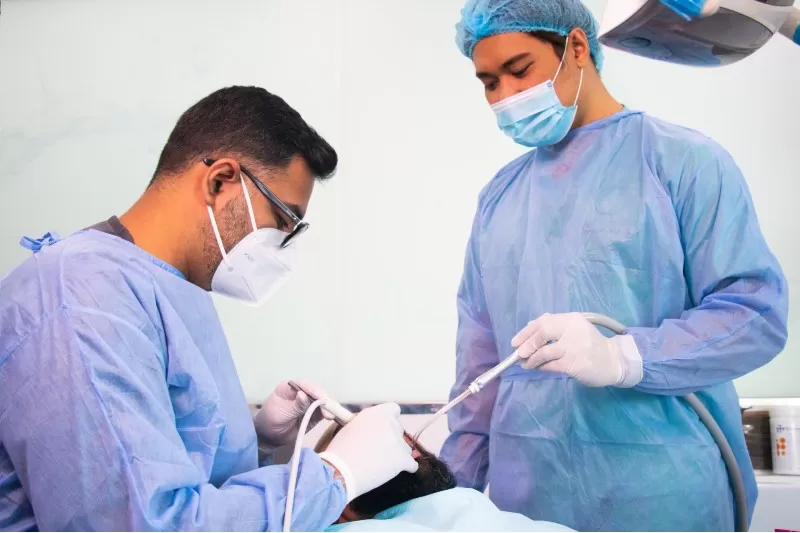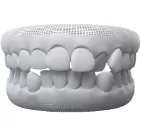
Normal/Surgical Extraction
Nobody enjoys losing a tooth. In some situations, though, it is required. Such a procedure is typically necessary following a traumatic injury that leaves a person unable to chew correctly, as well as serious decay or inflammation that does not heal with treatment. Some reasons why normal/surgical extraction has to be done include:
Infection and inflammation
When an infection or inflammatory process affects a tooth, it’s possible for it to occasionally spread to the rest of the oral cavity, endangering your oral health. The majority of the time, medications are used to treat these infections; nevertheless, occasionally, even the most potent antibiotics are useless, necessitating treatments like tooth extraction.
Lack of space in your mouth
This also may play a role. Most often, orthodontic treatment is employed to straighten crooked teeth. Additionally, your dentist would probably advise tooth extraction if your teeth are excessively big and take up too much space in your mouth.
Dental Extraction Methods
Surprising to you, there are two types of tooth extraction: basic and surgical. Simple tooth extraction, as the name implies, is a less complex form of removal used when the teeth are visible and simpler to access. Making an incision is a necessary step in the surgical procedure so the dentist may reach the tooth. Both methods are employed, for instance, when removing wisdom teeth. You read more about both kinds of surgeries here:
Simple Tooth Extraction
A tooth extraction is a method for removing a tooth. A decayed tooth, one that has been severely harmed by illness, or one that has undergone trauma may require extraction.
As was previously said, the straightforward method is to extract an already-erupted tooth. You will be comfortable throughout the treatment thanks to the local anesthetic the dentist will employ.
It’s very normal for your mouth to change in some ways. It is usually a good idea to discuss any concerns or issues you may have with your dentist. We’ve compiled a list of straightforward recommendations that will speed up recovery, lessen aggravation, and improve your experience.
Tooth Extraction Surgery
This surgery involved pulling the teeth back and forth in order to dislodge them. The tooth will then be pulled. This procedure is routinely used to get rid of wisdom teeth.
A surgical technique is a more complicated procedure, as one might anticipate. Even though this procedure is frequently called “wisdom tooth surgery,” it can be applied to any tooth. During a tooth extraction, the dentist pulls out teeth that haven’t yet broken through the gums. The gum tissue surrounding the tooth will be cut. Before extracting the tooth, they might occasionally have to divide it into several pieces. Many times, impacted wisdom teeth are surgically removed
Your teeth are designed to help you chew food, bite things, and maintain the natural position of your jawbone and mouth.
A dentist will therefore take considerable care to preserve, repair, and replace a patient’s teeth. But occasionally, it can be essential for your dentist to remove one or more of your teeth.
Your expert dentist at Mint Dental Care will take care to keep you as comfortable as possible throughout the extraction procedure. The steps you’ll go through during the procedure will be discussed with you by your dentist. Your dentist could use a local anesthetic to make you more comfortable throughout the procedure.
Make sure to discuss your concerns with your dentist if you’re apprehensive about having a tooth removed. Before beginning the operation, your dentist will make every effort to make sure you’re at ease.
Visit Your Dentist Regularly
The goal of a routine dental examination is to prevent problems from developing in the future. Education on appropriate oral hygiene, routine care, proactive cleanings, diagnosis, and treatment will help you keep your teeth healthy and cavity-free. Preventive dentistry is beneficial to both adults and children. Visiting the dentist on a regular basis may help you avoid having the following conditions:
Tooth decay and cavities
Gingivitis and gum diseases
Enamel loss & tooth sensitivity
Tooth decay and cavities
Our Team Members
Dr. Reji Moideen
Medical Director, Specialist Orthodontist
Dr. Shashank Trivedi
Specialist Orthodontist
Dr. Vishita Navin
Specialist Pediatric Dentist
Dr. Neha Singh
Specialist Endodontics
Dr. Ketki Rajebahadur
Specialist Implantologist
Dr. Zeeshanali Moosabhoy
General Dentist
Dr. Noha Khorshed
General Dentist
Dr Ibrahim Mirzoyev
Specialist Implantologist
Dr. Luke Kale
Specialist Oral and Maxillofacial Surgeon and Implantologist

















